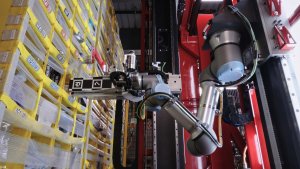Is Now The Best Time To Start a Robotics Company?
The stars have aligned to make the UK an attractive home for the robotics industry.

Robots are the talk of the town at the moment. You don't need to look far down the news to see rafts of stories about driverless cars, drones that deliver packages, friendly androids that look after elderly people, or the such-like. Without doubt, the inevitability of our robotised future has truly captured the collective psyche.
However, in practice, there is still a huge amount of work to be done before the sometimes halcyon, sometimes horrific visions of tomorrow can start to come to pass. In fact, in many domains there's pretty much a blank canvass for entrepreneurs to create robotics start-ups to address a near-limitless range of available real-world challenges.
At Britbots we spend much of the time speaking with brilliant, visionary roboticists and never cease to be amazed by the sheer range of the endeavours that are being undertaken.
In previous years, the main market for commercial robots was for use in high-volume manufacturing. However the last twenty-four months have seen a Cambrian explosion of new robotics companies being set up to perform tasks across a wide sectors such as, for example, agriculture, logistics, facilities management, healthcare and domestic tasks.
Here are a few of the reasons why we think it is such a good time, right now, to launch a robotics start–up in Britain:
There’s been a dramatic reduction in the cost and availability of components and software for robotics
With the increased accessibility of 3D-printing and other low-run manufacturing technologies in public maker-spaces, the hardware costs of creating robot prototypes and early-versions is dramatically lower than it ever has been in the past.
Additionally these production methods, along with more sophisticated computer simulations, make it possible to rapidly iterate towards optimal structural and mechanical solutions. There are also many more general-purpose robotics platforms, sensors and fixtures available now, meaning that much less need be built from scratch.
On the software side, an ever-increasing quantity of useful open source components and pay-per-use systems are becoming available to robotics engineers, particularly in the area of cognitive computing and artificial intelligence where particularly rapid advances are being made.
Google’s release of its TensorFlow platform last month is a good example of this. The capabilities of the new generation of robots will be far ahead of anything we’ve seen before and built for a fraction of the cost.
This country has a very friendly business climate to launch technology start-ups
The start-up culture in the UK has really flourished in recent years and, in particular, it has become much easier for young companies to raise seed capital since the introduction of the Seed Enterprise Investment Scheme (SEIS) in 2012.
Late last year an investment fund specialising in backing robotics businesses, the British Robotics Seed Fund, opened specifically to support automation-focused start-ups that have high ambitions.
Smart use of crowdsourcing and services-on-demand can make today’s start-ups dramatically more efficient
The costs involved in launching an early-stage venture can be dramatically reduced by taking advantage of the wide array of business services that can outsourced to the crowd or managed via affordable software-as-a-service platforms.
Founders can now keep the number of staff within their organisation at low-level whilst still providing a fully-functioning operation. The consequence of this is that companies can become economically viable substantially more rapidly than previously was possible.
Young robotics entrepreneurs can tap into a supportive ecosystem of mentors and collaborative suppliers
Britbots looks to provide a nurturing ecosystem for people who are starting robotics businesses in the UK. For the companies that the British Robotics Seed Fund invests we put in place a mentoring programme, providing expertise and support to entrepreneurs in growing their revenues and improving their products.
Equally, many component and platform suppliers are often prepared to provide preferential packages to launch exciting new robotics concepts.
Getting started?
So what should be your initial steps if you’ve created a concept for a robot which you’d like to try and take forward as a commercial product? Well, here’s a short list of things to consider:
1. Try and develop a prototype of your concept. If you don’t have the skills to build it yourself, try and find some collaborators who can work with you on the project to do the bits you can’t;
2. Speak to potential users about your robot idea to test whether they like the sound of it and how they would use it. Show them drawings or models so they can get a sense of what the robot looks like;
3. Start to develop an idea of what your business might look like. Will people buy a service from you or will they pay for the robot itself;
3. Investigate what other people are doing in other parts of the world to see the state of the art. One good place to start your research is The Robot Report.
Visit us at www.britbots.com to find out more about starting a robotics company in the UK. Free advice is available and we’re happy to make introductions that could help make your business concept become a reality.
Thanks for signing up to Minutehack alerts.
Brilliant editorials heading your way soon.
Okay, Thanks!


